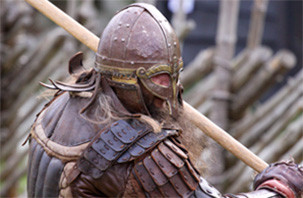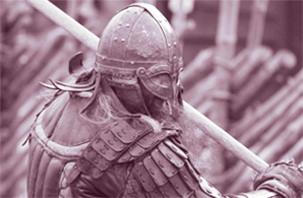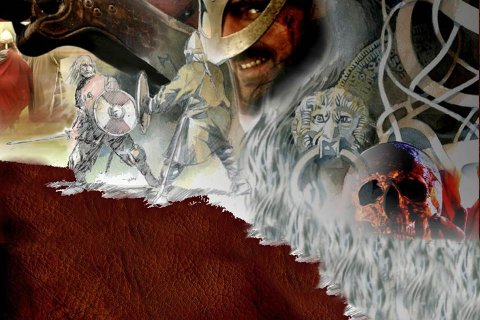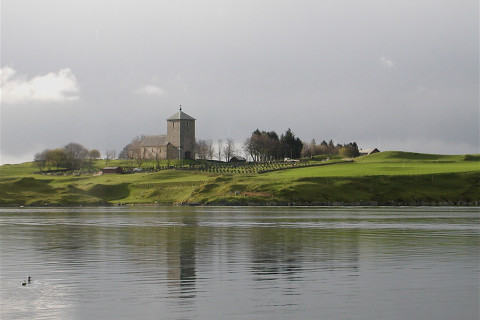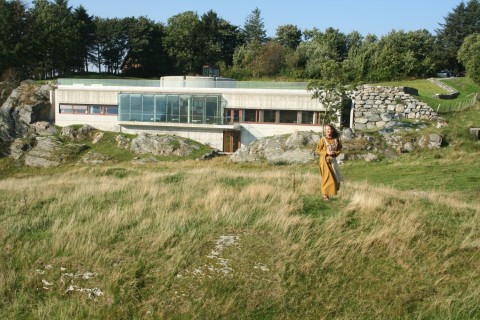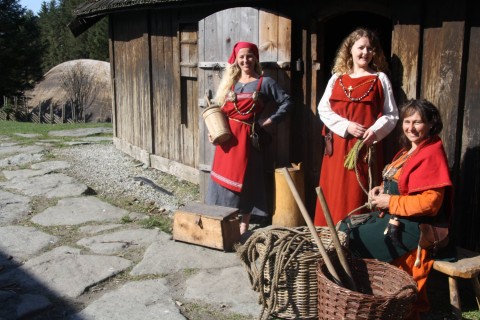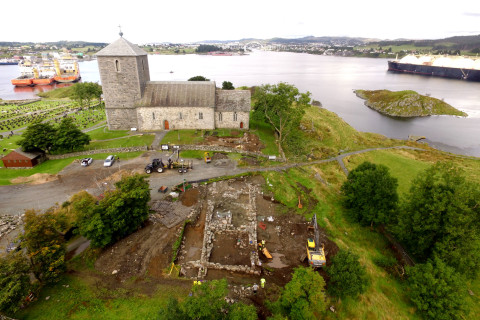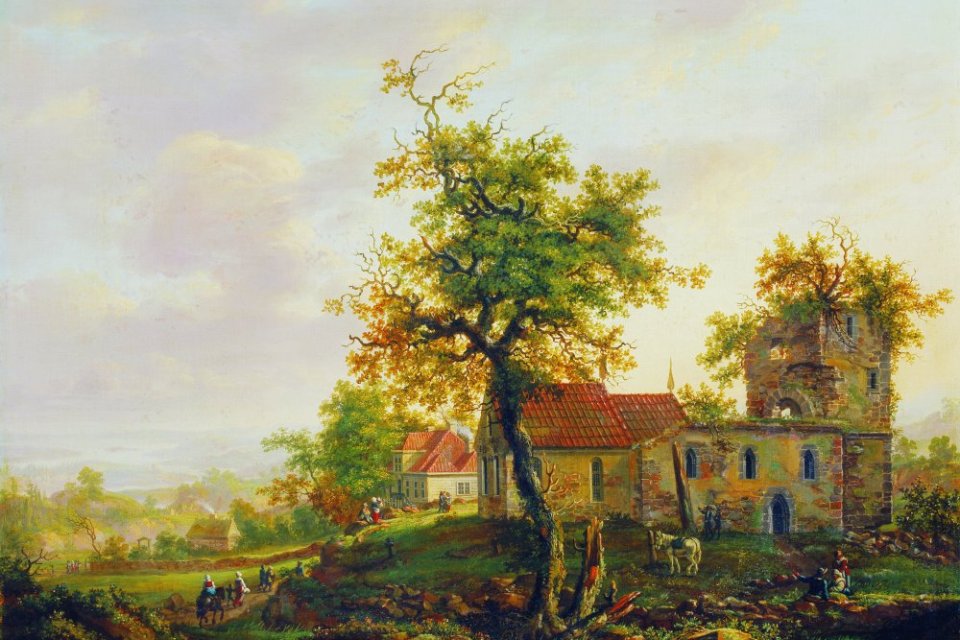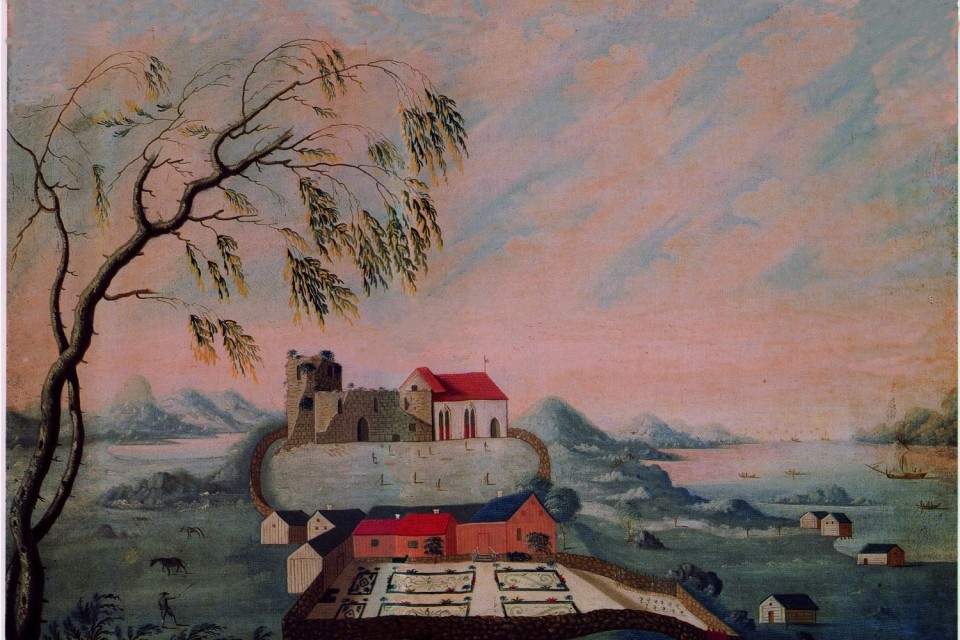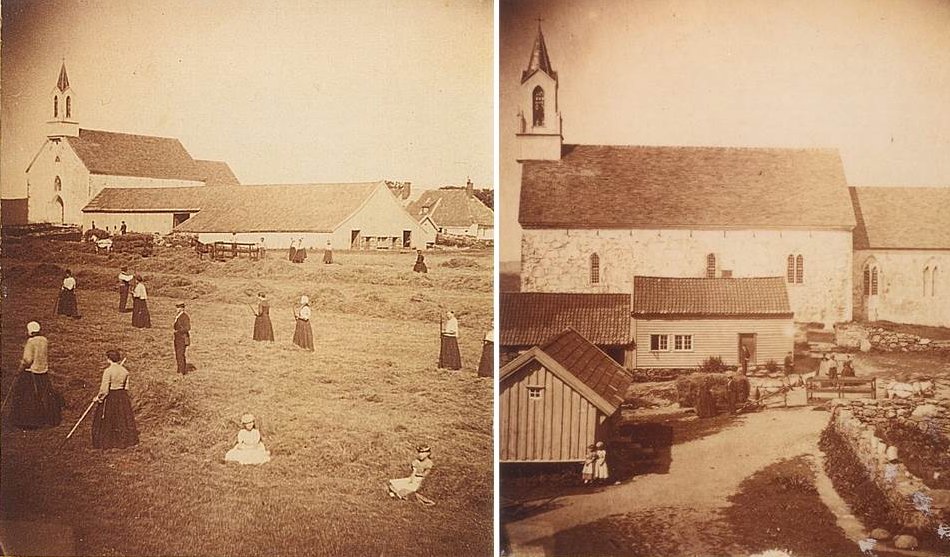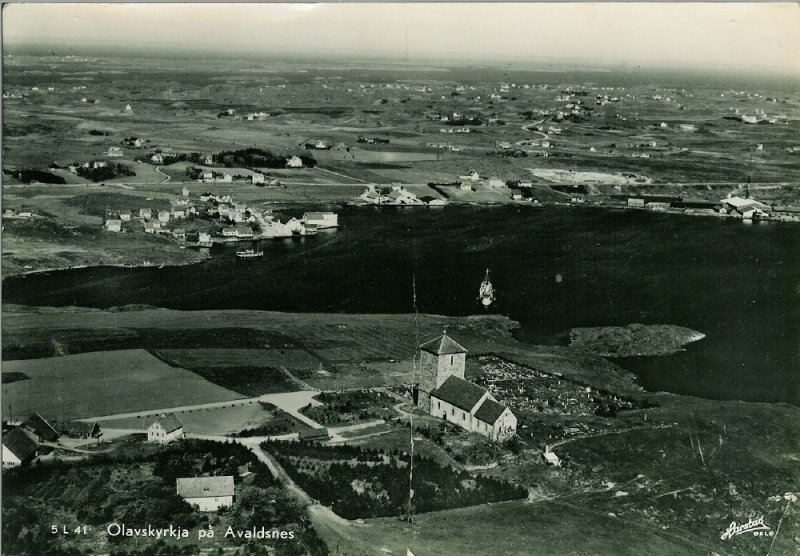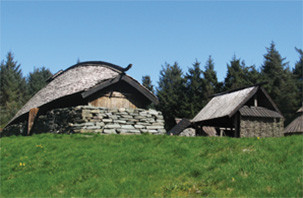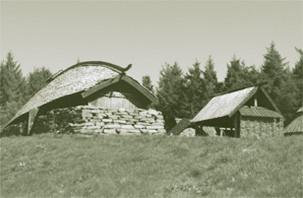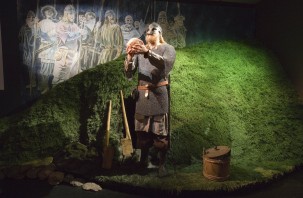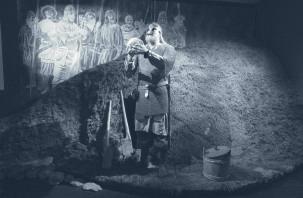Written sources
Text: Marit Synnøve Vea
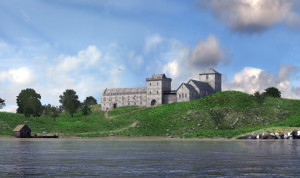
Avaldsnes Royal manor seen from the strait Karmsund. Reconstruction based on archaeological excavations in 2017. (ARKIKON)
WRITTEN SOURCES -WITH REFERENCES TO THE ROYAL ESTATE
The royal estate at Avaldsnes is referred to in the Sagas of the Norwegian Kings, the Heroic Sagas and in ancient skaldic poems. These sources deal with events that happened at Avaldsnes. Sometimes they also tell of burial mounds, standing stones and buildings, but the Old Norse sources give little information as to the exact location and appearance of the royal estate buildings.
As examples: In the ancient poem Gudrunkvida (lay about Gudrun), we learn that Gudrun, grieving for the death of Sigurd Fåvnesbane, goes into the mountains: for five whole days until I could see Half’s high hall. The chronicler Snorri Sturlason’s accounts of the events that took place at Avaldsnes during the Viking Age mention several buildings, but these were more likely based on the medieval buildings he witnessed during his visit to Avaldsnes in the 13th century.
CONTEMPORARY SOURCES
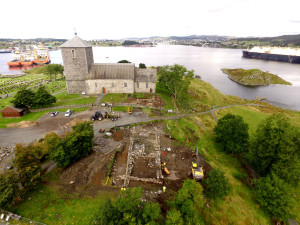
2017: The Royal Manor project excavated the Medieval Royal Manor at Avaldsnes. The main building was built by King Haakon Haakonsson and completed by King Haakon V Magnusson aron 1300. (Photo: Linsaa, Tommy Olsen)
Papal letter of 1247
In 1247, Pope Innocent IV granted king Haakon Haakonsson the right to elect clergy to churches built by the king himself, his ancestors or successors on three of the royal manors. This letter is considered an incentive for construction of St Olaf’s church at Avaldsnes. (1)
The Saga of Haakon Haakonson (Hákonar saga Hákonarsonar)
The Saga of Haakon Haakonson is an n Old Norse Kings’ Saga, telling the story of King Haakon Haakonson. The saga was written in the 1260s by the Icelandic historian Sturla Þórðarson on commission of Magnus the Law-mender (Magnús lagabœtir) just after his father Haakon died in 1263.
At the end of the saga we can read: At Avaldsnes he (Haakon Haakonsson) built a church of stone, which is the fourth largest church in the rural districts of Norway. (På Avaldsnes let han gjera ei steinkyrkje som er den fjerde største landskyrkja i Noreg.) The Norse sagas tell about other churches at Avaldsnes before St Olaf’s church, but we do not know if these were built of stone.
Royal charters
A few written documents from the time of the royal court at Avaldsnes in the Middles Ages have been preserved.
The first known royal charter from Avaldsnes was issued by King Eirik Magnusson in 1297.
King Haakon V Magnusson issued two charters in 1308, one in 1309 and one in 1313.
Hafthor Jonsson, the King’s son-in-law, was one of the granters of a charter in 1314.
A royal charter issued in 1322 show that a law-thing was convened on Avaldsnes that year.
King Magnus VII Eiriksson issued a royal charter at Avaldsnes in 1355.
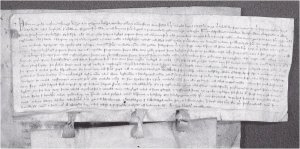
Royal Charter issued at Avaldsnes by Haakon Haakonson in 1308. (Photo Riksarkivet)
In 1374, King Haakon VI Magnusson issued the last known royal charter at Avaldsnes, 6 years after the royal manor had been put on fire by the Hanseatic traders in 1368.
Will of Haakon V Haakonson
In his will, written between 1312 and 1319, Haakon V Haakonsson stated that all royal income from Karmøy was to be allocated towards construction of the church until completion. He also mentions a number of precious gifts to be donated to the church. (2)
Complaint letter from the King VI Magnusson
In a letter written during the summer 1370, Haakon VI Magnusson accuses the Hanseatic merchants of having burnt down his royal estate at Avaldsnes in 1268.
During peacetime, they (the Hanseatic merchants) ravaged and burnt the kings estates at Avaldsnes and the others which lay along the Karmsund Sound, his forests at Selbjørn, the houses for the poor travellers between Bergen and Karmsund in addition to the farms and houses situated along the Karmsund Strait belonging to the kings subjects. The kings losses were in excess of “2000 marks burnet silver. (Extract from complaint no. 8 which King Håkon VI Magnusson directed at the eastern Hanseatic merchants, after Frode Fyllingsnes.)
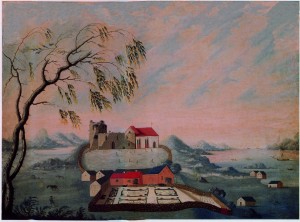
Painting by Johs. Rasch from 1738. The painting records Avaldsnes with the church and vicarage as it looked like before the vicarage burned in 1698, In the background we get a glimpse of all the burials mounds at the Blood Heights and alongside the strait Karmsund. (The original is in the National Museum i Copenhagen) .
Old Reports, articles, paintings etc.
Old reports and articles, written depictions of tales passed on orally, village registers, old paintings, photographs and other archive material can provide vital information regarding the building remains at Avaldsnes.
More information about this can be found in the article Exploring Avaldsnes 1540 – 2005”, by Dagfinn Skre. «Avaldsnes – A Sea-Kings’ Manor in First-Millennium Western Scandinavia». 2019
EXERPTS FROM THE SAGAS OF THE NORWEGIAN KINGS WHERE THE BUILDINGS OF THE ROYAL ESTATE IS MENTIONED:
HEIMSKRINGLA, THE SAGA OF KING OLAF TRYGGVASON
Eyvind Kelda and other warlocks are drowned
When spring (A.D. 998) came, King Olaf went out to Viken, and was on visits to his great farms. He sent notice over all Viken that he would call out an army in summer, and proceed to the north parts of the country. Then he went north to Agder; and when Easter was approaching he took the road to Rogaland with 300 (=360) men, and came on Easter evening north to Ogvaldsnes, (Avaldsnes) in Kormt Island, where an Easter feast was prepared for him.
That same night came Eyvind Kelda to the island with a well-manned long-ship, of which the whole crew consisted of sorcerers and other dealers with evil spirits. Eyvind went from his ship to the land with his followers, and there they played many of their pranks of witchcraft. Eyvind clothed them with caps of darkness, and so thick a mist that the king and his men could see nothing of them; but when they came near to the house at Ogvaldsnes, it became clear day.
Then it went differently from what Eyvind had intended: for now there came just such a darkness over him and his comrades in witchcraft as they had made before, so that they could see no more from their eyes than from the back of their heads but went round and round in a circle upon the island.
When the king’s watchman saw them going about, without knowing what people these were, they told the king. Thereupon he rose up with his people, put on his clothes, and when he saw Eyvind with his men wandering about he ordered his men to arm, and examine what folk these were. The king’s men discovered it was Eyvind, took him and all his company prisoners, and brought them to the king. Eyvind now told all he had done on his journey.
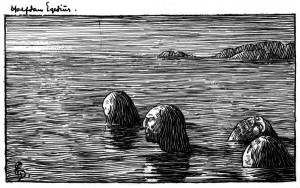
The wizzards (warlocks) are drowned at Skrattaskjær. (Ill. Halfdan Egedius)
Then the king ordered these all to be taken out to a skerry which was under water in flood tide, and there to be left bound. Eyvind
Odin visits the King at Ogvaldsnes
It is related that once on a time King Olaf was at a feast at this Ogvaldsnes, and one eventide there came to him an old man very gifted in words, and with a broad-brimmed hat upon his head. He was one-eyed, and had something to tell of every land.
He entered into conversation with the king; and as the king found much pleasure in the guest’s speech, he asked him concerning many things, to which the guest gave good answers: and the king sat up late in the evening. Among other things, the king asked him if he knew who the Ogvald had been who had given his name both to the ness and to the house.
The guest replied, that this Ogvald was a king, and a very valiant man, and that he made great sacrifices to a cow which he had with him wherever he went, and considered it good for his health to drink her milk. This same King Ogvald had a battle with a king called Varin, in which battle Ogvald fell. He was buried under a mound close to the house; “and there stands his stone over him, and close to it his cow also is laid.” Such and many other things, and ancient events, the king inquired after.
Now, when the king had sat late into the night, the bishop reminded him that it was time to go to bed, and the king did so. But after the king was undressed, and had laid himself in bed, the guest sat upon the foot-stool before the bed, and still spoke long with the king; for after one tale was ended, he still wanted a new one.
Then the bishop observed to the king, it was time to go to sleep, and the king did so; and the guest went out. Soon after the king awoke, asked for the guest, and ordered him to be called, but the guest was not to be found.
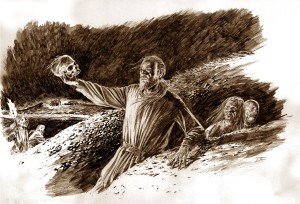
The saga told by Odd Munk tells that Olav opened several burial mounds at Avaldsnes. In one he found the bones of king Augvald, in another he found the bones og Augvald’s holy cow. (Ill. Dag Frognes)
The morning after, the king ordered his cook and cellar-master to be called, and asked if any strange person had been with them. They said, that as they were making ready the meat a man came to them, and observed that they were cooking very poor meat for the king’s table; whereupon he gave them two thick and fat pieces of beef, which they boiled with the rest of the meat. Then the king ordered that all the meat should be thrown away, and said this man can be no other than the Odin whom the heathens have so long worshipped; and added, “but Odin shall not deceive us.”
The manuscripts after Odd Munk have more complete details about these events: (Soga om Olav Tryggvason etter Odd munk Snorrason. Translated by Magnus Rindal. Norrøne bokverk 46. Oslo: Samlaget, 1977.)
HEIMSKRINGLA, SAGA OF ST OLAF
Asbjørn sails south to buy grain
(….)
They sailed from the north in summer; and nothing is told of their voyage until one day, about the time the days begin to shorten, they came to Karmtsund, and landed at Augvaldsnes. Up in the island Karmt there is a large farm, not far from the sea, and a large house upon it called Augvaldsnes, which was a king’s house, with an excellent farm, which Thorer Sel, who was the king’s bailiff, had under his management. Thorer was a man of low birth, but had swung himself up in the world as an active man; and he was polite in speech, showy in clothes, and fond of distinction, and not apt to give way to others, in which he was supported by the favour of the king. He was besides quick in speech, straightforward, and free in conversation. Asbjorn, with his company, brought up there for the night; and in the morning, when it was light, Thorer went down to the vessel with some men, and inquired who commanded the splendid ship. Asbjorn named his own and his father’s name. Thorer asks where the voyage was intended for, and what was the errand.
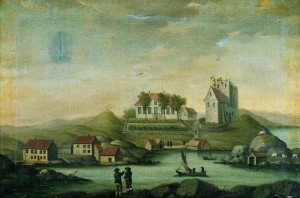
Painting from 1710, unknown artist, private owned. Note “The Cow’s mound” to the left of the the painting and the rounded shape of the church yard. In the foreground the trading place Gloppe that existed from around 1650 – 185O. (Photo O.Værings Eftf.)
Asbjorn replies, that he wanted to buy corn and malt; saying, as was true, that it was a very dear time north in the country. “But we are told that here the seasons are good; and wilt thou, farmer, sell us corn? I see that here are great corn stacks, and it would be very convenient if we had not to travel farther.”
Thorer replies, ” I will give thee the information that thou needst not go farther to buy corn, or travel about here in Rogaland; for I can tell thee that thou must turn about, and not travel farther, for the king forbids carrying corn out of this to the north of the country. Sail back again, Halogalander, for that will be thy safest course.”
Asbjorn replies, ” If it be so, bonde, as thou sayest, that we can get no corn here to buy, I will, notwithstanding, go forward upon my errand, and visit my family in Sole, and see my relation Erling’s habitation.”
Thorer: “How near is thy relationship to Erling?”
Asbjorn: “My mother is his sister.”
Thorer: “It may be that I have spoken heedlessly, if so be that thou art sister’s son of Erling.”
Thereupon Asbjorn and his crew struck their tents, and turned the ship to sea. Thorer called after them. “A good voyage, and come here again on your way back.” Asbjorn promised to do so, sailed away, and came in the evening to Jadar. Asbjorn went on shore with ten men; the other ten men watched the ship. When Asbjorn came to the house he was very well received, and Erling was very glad to see him, placed him beside himself, and asked him all the news in the north of the country. Asbjorn concealed nothing of his business from him; and Erling said it happened unfortunately that the king had just forbid the sale of corn. “And I know no man here.” says he, ” who has courage to break the king’s order, and I find it difficult to keep well with the king, so many are trying to break our friendship.”
Asbjorn replies, ” It is late before we learn the truth. In my childhood I was taught that my mother was freeborn throughout her whole descent, and that Erling of Sole was her boldest relation; and now I hear thee say that thou hast not the freedom, for the king’s slaves here in Jadar, to do with thy own corn what thou pleasest.”
Erling looked at him, smiled through his teeth, and said, ” Ye Halogalanders know less of the king’s power than we do here; but a bold man thou mayst be at home in thy conversation. Let us now drink, my friend, and we shall see tomorrow what can be done in thy business.”
They did so, and were very merry all the evening. The following day Erling and Asbjorn talked over the matter again, and Erling said. “I have found out a way for you to purchase corn, Asbjorn. It is the same thing to you whoever is the seller.” He answered that he did not care of whom he bought the corn, if he got a good right to his purchase. Erling said. “It appears to me probable that my slaves have quite as much corn as you require to buy; and they are not subject to law, or land regulation, like other men.”
Asbjorn agreed to the proposal. The slaves were now spoken to about the purchase, and they brought forward corn and malt, which they sold to Asbjorn, so that he loaded his vessel with what he wanted. When he was ready for sea Erling followed him on the road, made him presents of friendship, and they took a kind farewell of each other.
Thorer Sel confiscates Asbjorn’s grain and takes his sail
Asbjorn got a good breeze, landed in the evening at Karmtsund, near to Augvaldsnes, and remained there for the night. Thorer Sel had heard of Asbjorn’s voyage, and also that his vessel was deeply laden. Thorer summoned people to him in the night, so that before daylight he had sixty men; and with these he went against Asbjorn as soon as it was light, and went out to the ship just as Asbjorn and his men were putting on their clothes. Asbjorn saluted Thorer, and Thorer asked what kind of goods Asbjorn had in the vessel.
He replied, ” Corn and malt.”
Thorer said, ” Then Erling is doing as he usually does, and despising the king’s orders, and is unwearied in opposing him in all things, insomuch that it is wonderful the king suffers it.”
Thorer went on scolding in this way, and when he was silent Asbjorn said that Erling’s slaves had owned the corn.
Thorer replied hastily, that he did not regard Erling’s tricks. “And now, Asbjorn, there is no help for it; ye must either go on shore, or we will throw you overboard; for we will not be troubled with you while we are discharging the cargo.”
Asbjorn saw that he had not men enough to resist Thorer; therefore he and his people landed, and Thorer took the whole cargo out of the vessel. When the vessel was discharged Thorer went through the ship, and observed. “Ye Halogalanders have good sails: take the old sail of our vessel and give it them; it is good enough for those who are sailing in a light vessel.” Thus the sails were exchanged. When this was done Asbjorn and his comrades sailed away north along the coast, and did not stop until they reached home early in whiter.
This expedition was talked of far and wide, and Asbjorn had no trouble that winter in making feasts at home. Thorer Hund invited Asbjorn and his mother, and also all whom they pleased to take along with him, to a Yule feast; but Asbjorn sat at home, and would not travel, and it was to be seen that Thorer thought Asbjorn despised his invitation, since he would not come. Thorer scoffed much at Asbjorn’s voyage. “Now,” said he, “it is evident that Asbjorn makes a great difference in his respect towards his relations; for in summer he took the greatest trouble to visit his relation Erling in Jadar, and now will not take the trouble to come to me in the next house. I don’t know if he thinks there may be a Thorer Sel in his way upon every holm.” Such words, and the like sarcasms, Asbjorn heard of; and very ill satisfied he was with his voyage, which had thus made him a laughing-stock to the country, and he remained at home all winter, and went to no feasts.
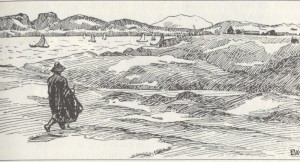
“Asbjorn on his way to the royal manor at Avaldsnes”. (From the saga of St. Olaf. Ill. I. Werenskiold)
The murder of Thorer Sel
Asbjorn had a long-ship standing in the noust (shipshed), and it was a snekke (cutter) of twenty benches; and after Candlemas (February 2, 1023), he had the vessel put in the water, brought out all his furniture, and rigged her out. He then summoned to him his friends and people, so that he had nearly ninety men all well armed. When he was ready for sea, and got a wind, he sailed south along the coast, but as the wind did not suit, they advanced but slowly. When they came farther south they steered outside the rocks, without the usual ships’ channel, keeping to sea as much as it was possible to do so.
Nothing is related of his voyage before the fifth day of Easter (April 18, 1023), when, about evening, they came on the outside of Karmt Island. This island is so shaped that it is very long, but not broad at its widest part; and without it lies the usual ships’ channel. It is thickly inhabited; but where the island is exposed to the ocean great tracts of it are uncultivated. Asbjorn and his men landed at a place in the island that was uninhabited. After they had set up their ship-tents Asbjorn said, ” Now ye must remain here and wait for me. I will go on land in the isle, and spy what news there may be which we know nothing of.” Asbjorn had on mean clothes, a broadbrimmed hat, a fork in his hand, but had girt on his sword under his clothes.
He went up to the land, and in through the island; and when he came upon a hillock, from which he could see the house on Augvaldsnes, and on as far as Karmtsund, he saw people in all quarters flocking together by land and by sea, and all going up to the house of Augvaldsnes. This seemed to him extraordinary; and therefore he went up quietly to a house close by, in which servants were cooking meat. From their conversation he discovered immediately that the king Olaf had come there to a feast, and that he had just sat down to table. Asbjorn turned then to the feasting-room, and when he came into the ante-room one was going in and another coming out; but nobody took notice of him.
The hall-door was open, and he saw that Thorer Sel stood before the table of the high-seat. It was getting late in the evening, and Asbjorn heard people ask Thorer what had taken place between him and Asbjorn; and Thorer had a long story about it, in which he evidently departed from the truth. Among other things he heard a man say, ” How did Asbjorn behave when you discharged his vessel?” Thorer replied, ” When we were taking out the cargo he bore it tolerably, but not well; and when we took the sail from him he wept.”
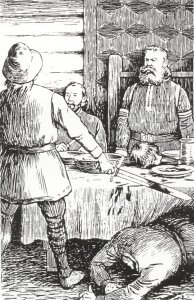
Asbjorn beheads Thorer Sel, so that the head fell upon the table before the king, (Ill. Theodor Kittelsen)
When Asbjorn heard this he suddenly drew his sword, rushed into the hall, and cut at Thorer. The stroke took him in the neck, so that the head fell upon the table before the king, and the body at his feet, and the table-cloth was soiled with blood from top to bottom. The king ordered him to be seized and taken out. This was done. They laid hands on Asbjorn, and took him from the hall. The table-furniture and table-cloths were removed, and also Thorer’s corpse, and all the blood wiped up. The king was enraged to the highest; but remained quiet in speech, as he always was when in anger.
Asbjorn is sentenced to death by King Olav
Skjalg Erlingson stood up, went before the king, and said, ” Now may it go, as it often does, that every case will admit of alleviation. I will pay thee the mulct for the bloodshed on account of this man, so that he may retain life and limbs. All the rest determine and do, king, according to thy pleasure.”
The king replies, ” Is it not a matter of death, Skjalg, that a man break the Easter peace; and in the next place that he kills a man in the king’s lodging; and in the third that he makes my feet his execution-block, although that may appear a small matter to thee and thy father?” Skjalg replies, ” It is ill done, king, in as far as it displeases thee; but the deed is, otherwise, done excellently well. But if the deed appear to thee so important, and be so contrary to thy will, yet may I expect something for my services from thee; and certainly there are many who will say that thou didst well.”
The king replies, ” Although thou hast made me greatly indebted to thee, Skjalg, for thy services, yet I will not for thy sake break the law, or cast away my own dignity.” Then Skjalg turned round, and went out of the hall. Twelve men who had come with Skjalg all followed him, and many others went out with him.
Skjalg said to Thorarin Nefiulfson, ” If thou wilt have me for a friend, take care that this man be not killed before Sunday.” Thereupon Skjalg and his men set off, took a rowing boat which he had, and rowed south as fast as they could, and came to Jadar with the first glimpse of morning. They went up instantly to the house, and to the loft in which Erling slept. Skjalg rushed so hard against the door that it burst asunder at the nails. Erling and the others who were within started up. He was in one spring upon his legs, grasped his shield and sword, and rushed to the door, demanding who was there.
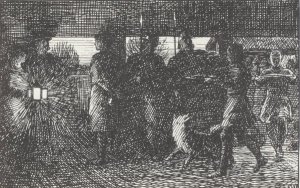
Asbjorn is tied up at Avaldsnes. (Ill E. Werenskiold)
Skjalg named himself, and begs him to open the door. Erling replies, ” It was most likely to be thee who hast behaved so foolishly; or is there any one who is pursuing thee?” Thereupon the door was unlocked. Then said Skjalg, ” Although it appears to thee that I am so hasty, I suppose our relation Asbjorn will not think my proceedings too quick; for he sits in chains there in the north at Augvaldsnes, and it would be but manly to hasten back and stand by him.” The father and son then had a conversation together, and Skjalg related the whole circumstances of Thorer Sel’s murder.
Thorarin Nefiulfson
King Olaf took his seat again when everything in the hall was put in order, and was enraged beyond measure. He asked how it was with the murderer. He was answered, that he was sitting out upon the doorstep under guard.
The king says, ” Why is he not put to death?”
Thorarin Nefiulfson replies, “Sire, would you not call it murder to kill a man in the night-time?”
The king answers, “Put him in irons then, and kill him in the morning.”
Then Asbjorn was laid in chains, and locked up in a house for the night. The day after the king heard the morning mass, and then went to the Thing, where he sat till high mass. As he was going to mass he said to Thorarin, “Is not the sun high enough now in the heavens that your friend Asbjorn may be hanged?”
Thorarin bowed before the king, and said, ” Sire, it was said by Bishop Sigurd on Friday last, that the King who has all things in his power had to endure great temptation of spirit; and blessed is he who rather imitates him, than those who condemned the man to death, or those who caused his slaughter. It is not long till tomorrow, and that is a working day.”
The king looked at him, and said, ” Thou must take care then that he is not put to death to-day; but take him under thy charge, and know for certain that thy own life shall answer for it if he escape in any way.”
Then the king went away. Thorarin went also to where Asbjorn lay in irons, took off his chains, and brought him to a small room, where he had meat and drink set before him, and told him what the king had determined in case Asbjorn ran away. Asbjorn replies, that Thorarin need not be afraid of him. Thorarin sat a long while with him during the day, and slept there all night.
On Saturday the king arose and went to the early mass, and from thence he went to the Thing, where a great many bondes were assembled, who had many complaints to be determined. The king sat there long in the day, and it was late before the people went to high mass. Thereafter the king went to table. When he had got meat he sat drinking for a while, so that the tables were not removed. Thorarin went out to the priest who had the church under his care, and gave him two marks of silver to ring in the Sabbath as soon as the king’s table was taken away.
When the king had drunk as much as he wished the tables were removed. Then said the king, that it was now time for the slaves to go to the murderer and put him to death. In the same moment the bell rang in the Sabbath. Then Thorarin went before the king, and said, ” The Sabbath-peace this man must have, although he has done evil.” The king said, ” Do thou take care, Thorarin, that he do not escape.”
The king then went to the church, and attended the vesper service, and Thorarin sat the whole day with Asbjorn. On Sunday the bishop visited Asbjorn, confessed him, and gave him orders to hear high mass. Thorarin then went to the king, and asked him to appoint men to guard the murderer. “I will now, ” he said, ” be free of this charge.” The king thanked him for his care, and ordered men to watch over Asbjorn, who was again laid in chains. When the people went to high mass Asbjorn was led to the church, and he stood outside of the church with his guard; but the king and all the people stood in the church at mass.
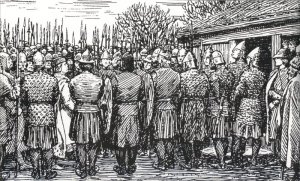
King Olav walks through the lines of Erling’s men. (Ill. E Werenskild)
The confrontation between King Olaf and Erling Skjalgson.
Now we must again take up our story where we left it, — that Erling and his son Skjalg held a council on this affair, and according to the resolution of Erling, and of Skjalg and his other sons, it was determined to assemble a force and send out message-tokens. A great multitude of people accordingly came together. They got ready with all speed, rigged their ships, and when they reckoned upon their force they found they had nearly 1500 men. With this war-force they set off, and came on Sunday to Augvaldsnes on Karmt Island.
They went straight up to the house with all the men, and arrived just as the Scripture lesson was read. They went directly to the church, took Asbjorn, and broke off his chains. At the tumult and clash of arms all who were outside of the church ran into it; but they who were in the church looked all towards them, except the king, who stood still, without looking around him. Erling and his sons drew up their men on each side of the path which led from the church to the hall, and Erling with his sons stood next to the hall.
When high mass was finished the king went immediately out of the church, and first went through the open space between the ranks drawn up, and then his retinue, man by man; and as he came to the door Erling placed himself before the door, bowed to the king, and saluted him. The king saluted him in return, and prayed God to help him. Erling took up the word first, and said, ” My relation, Asbjorn, it is reported to me, has been guilty of misdemeanor, king; and it is a great one, if he has done anything that incurs your displeasure. Now I am come to entreat for him peace, and such penalties as you yourself may determine; but that thereby he redeem life and limb, and his remaining here in his native land.”
The king replies, ” It appears to me, Erling, that thou thinkest the case of Asbjorn is now in thy own power, and I do not therefore know why thou speakest now as if thou wouldst offer terms for him. I think thou hast drawn together these forces because thou are determined to settle what is between us.”
Erling replies, ” Thou only, king, shalt determine, and determine so that we shall be reconciled.”
The king: “Thinkest thou, Erling, to make me afraid? And art thou come here in such force with that expectation? No, that shall not be; and if that be thy thought, I must in no way turn and fly.”
Erling replies, ” Thou hast no occasion to remind me how often I have come to meet thee with fewer men than thou hadst. But now I shall not conceal what lies in my mind, namely, that it is my will that we now enter into a reconciliation; for otherwise I expect we shall never meet again.” Erling was then as red as blood in the face.
Now Bishop Sigurd came forward to the king and said, ” Sire, I entreat you on God Almighty’s account to be reconciled with Erling according to his offer, — that the man shall retain life and limb, but that thou shalt determine according to thy pleasure all the other conditions.”
The king replies, ” You will determine.”
Then said the bishop, ” Erling, do thou give security for Asbjorn, such as the king thinks sufficient, and then leave the conditions to the mercy of the king, and leave all in his power.”
Erling gave a surety to the king on his part, which he accepted.
Thereupon Asbjorn received his life and safety, and delivered himself into the king’s power, and kissed his hand.
Erling then withdrew with his forces, without exchanging salutation with the king; and the king went into the hall, followed by Asbjorn. The king thereafter made known the terms of reconciliation to be these: — “In the first place, Asbjorn, thou must submit to the law of the land, which commands that the man who kills a servant of the king must undertake his service, if the king will. Now I will that thou shalt undertake the office of bailiff which Thorer Sel had, and manage my estate here in Augvaldsnes.” Asbjorn replies, that it should be according to the king’s will; “but I must first go home to my farm, and put things in order there.”
The king was satisfied with this, and proceeded to another guest-quarter. Asbjorn made himself ready with his comrades, who all kept themselves concealed in a quiet creek during the time Asbjorn was away from them. They had had their spies out to learn how it went with him, and would not depart without having some certain news of him.
Guðrúnarkviða hin forna
In Guðrúnarkviða hin forna (The Second Lay of Gudrún or Guðrúnarkviða hin forna ) we can read that Gudrun walks in the mountains for five days, until she could see the high hall of (King) Halfr. (Halfr is a descendant of king Ogvald/Augvald).
Fór ek af fjalli
fimm dægr talið,
unz ek höll Halfs
háva þekkðak.
Back
